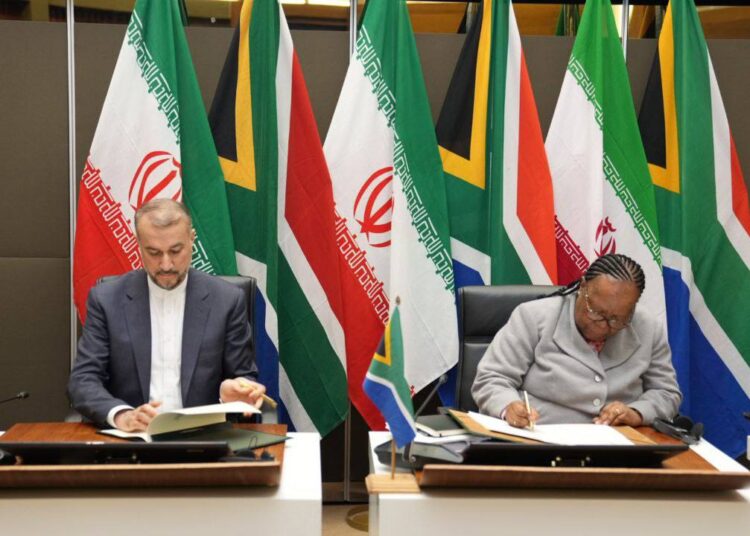During her visit to Tehran, Naledi Pandour, the Minister of International Relations and Cooperation of South Africa, engaged in discussions with her Iranian counterpart, Hossein Amirabdollahian. The South African minister’s visit holds significant importance as part of Iran’s strategic objective to enhance relations with African countries, particularly South Africa. The Tehran-Pretoria bilateral relations development program entails expanding cooperation across various sectors and extending collaboration at regional and international levels. Consequently, diplomatic exchanges between Tehran and Pretoria have witnessed an increase.
South Africa, recognized as one of the leading economies on the African continent, is emerging as an international power. Given its favorable geographical location within Africa, this economically robust country can serve as a gateway for Iranian goods to access African markets and nations.
Iran and South Africa share a historical relationship and are both influential regional actors within Asia and Africa. Although their ties experienced a setback during South Africa’s apartheid era, relations resumed following the dismantling of apartheid. Meanwhile, Ebrahim Raisi, the President of Iran, has plans to visit South Africa soon. The upcoming visit aims to explore avenues for further cooperation between the two countries, particularly in economic, social, and cultural spheres. Additionally, the visit will involve finalizing exchanged documents and memorandums between the two nations.
Iran’s President previously traveled to South Africa late August to attend the BRICS summit, where Iran was invited to join the group. Membership in the BRICS group presents an outstanding opportunity for enhancing cooperation between Iran and South Africa. The role of BRICS is lauded for its positive impact on Tehran-Pretoria relations in various aspects. Notably, the group provides a foundation for increasing bilateral relations and serves as a platform for formulating multilateral agreements involving Iran and South Africa. Furthermore, it facilitates international cooperation in both economic and political domains.
At the Johannesburg Summit in South Africa, the BRICS group positioned itself as a forum dedicated to constructive dialogue and advocated for transforming the prevailing Western-centric global order into a multipolar framework within world politics.
The alignment between Iranian and South African officials indicates that Tehran and Pretoria share similar perspectives on numerous international issues, including the Palestinian question.
South Africa accounted for a substantial portion of Iran’s oil imports in the past decade. However, the interrupted relations between the two countries in recent years have adversely affected this trade partnership. Nevertheless, economic relations between Iran and South Africa have been gradually revitalizing, although South Africa’s market share in Iran’s exports remains minimal, constituting only 0.57% last year.
The Joint Economic Commission of Iran and South Africa, which had been dormant due to the limited bilateral trade volume and the lack of competitiveness within the African market for Iranian entrepreneurs, was reactivated during the Iranian foreign minister’s recent visit to South Africa. Consequently, the 15th Iran-South Africa Joint Economic Cooperation Commission took place in Pretoria on August 10, during which the commission’s memorandum of understanding was signed by the foreign ministers of both nations.
As part of the cooperation commission between the two nations, a total of 26 agreements have been established. Their implementation is a focal point during the ongoing deliberations between Iranian and South African officials.
Among the most notable agreements underpinning the Iran-South Africa cooperation are the consensus on customs facilitation, maritime transport, mitigation of dual taxation, and fostering of investment opportunities.
A prominent hurdle obstructing optimal economic relations between Iran and South Africa entails banking issues. Some subject-matter experts propose that barter systems could provide a viable solution to the financial complexities faced by these two countries.
Efforts channeled toward the formulation of trade contracts, collaborative discussions with the South African Customs Union, and broadening of trade ties stand among the strategies to enhance Iran-South Africa commerce. Trade analysts posit that preferential trade arrangements and the establishment of free trade zones could escalate the caliber of bilateral trade interactions. In this emerging economic landscape, South Africa could position itself as the primary hub for the distribution of Iranian goods across the African continent.






